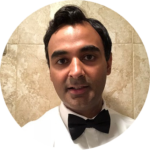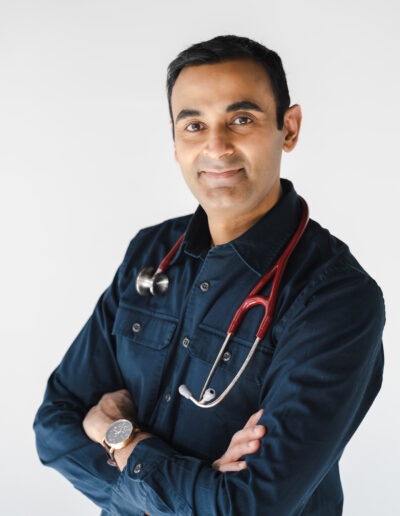Most busy professionals will try to make the claim that their job is the hardest. We live in an era where much is expected of us, and no matter what we do, it feels like we have to do more and more work, in smaller and smaller time slots. Welcome to the world in 2020. For those of us working in healthcare, being on the ball and on our A-Game is even more crucial, because nothing less than peoples’ lives depend on us. Needless to say then, our own wellbeing is critical in order to perform at our best. I can’t say that when I was in medical school and residency training, I had the healthiest habits that optimized my complete wellbeing. Especially at work. We underestimate how much the workplace is an opportunity for getting into healthy habits—because our mind is already hopefully in “the zone” and in a disciplined pattern (versus lying at home on the couch). If I could go back and change things, I would—because I’m sure it would have helped me not only perform better, but also be much happier too. Well, better late than never. When I am working in the hospital or clinic now, I really make a conscious effort to focus on my physical and mental wellness. Here are 5 things that really work for me:
1.Diet
Hippocrates, the father of medicine from ancient Greece, said over 2500 years ago: “Let Food by thy Medicine, and Medicine be thy Food”. We are literally what we eat. Junk in, junk out. I have never been a big breakfast person, but will always have a cup of tea in the morning (studies show tea’s immense calming effects) and a small healthy low-fat breakfast—always including a fruit like a banana or a handful of blueberries. I then have a mid-morning snack, such as a high fiber or protein bar. For lunch, typically a small balanced meal incorporating a healthy protein, a couple of vegetable portions, and a non-refined high fiber carbohydrate (I go low on the carbohydrates because I find it gives me post-lunch lethargy). I then have a mid- to late afternoon snack again (often a small fruit cup or yoghurt) and another cup of tea. Throughout the day, as much hydration as possible, ideally just water.
The basic concepts throughout my workday are: regular calorie intake and nutritious snacks, staying low carb, and a healthy protein source.
2.Exercise & energy boosts
I wish the places that I work would have a gym to nip away for a bit during the day (something I believe would actually make me more efficient at work too). But given that I usually go to the gym before work, that doesn’t mean that I allow myself to remain sedentary during the job. I strive for regular energy bursts during the day to keep up my mental concentration. Of course, exercise is one of nature’s best energy boosts. This could include regularly ascending the stairs at a good pace, walking briskly between hospital floors (not sluggish or slow), and also trying to get outside and walk around the hospital or out to my car—at least a couple of times a day—to get some fresh air.
3.Taking mental breaks
Taking regular breaks may also coincide with sitting down to eat or taking walks as above, when I hit the “stop” button to reset. We are not machines that are built to work continuously. This may involve just sitting still and taking a few mindful deep breaths or having a quick friendly chat with a colleague (only if you’re talking about something positive!). A word too about the dreaded smart phone. I find it a distraction when I want to be focusing on patient care. I don’t want to look at text messages or emails. I usually switch it off in 2-3 hour blocks during the day.
4.Staying calm
This has been something that has really come with time over the years. There are a million and one things that can work us up and tip us over the edge. I remember when I first graduated, the things that used to really bother me in my daily work as a physician—now just fly right over me and I am able to maintain a better perspective. A disagreement with a colleague, a random administrative email that is telling me rudely to do something immediately, or asking me to explain a decision I made as a physician– well, those would have really made me fly off the handle at one point in my life. That doesn’t mean that I’ve lost my passion or become passive. It just means that I don’t allow certain small things to affect me for anything longer than a couple of seconds, and I don’t want to succumb to an emotional reaction or take things personally. I wish I could go back and change so many silly responses I had to trivial things—but I’m glad I’ve learned to handle things better now. Stress is just a chemical reaction when your adrenaline and cortisol levels shoot up in response to a stimulus. You are in control of what does this to you.
5.Moving forward
Something that leads to a lot of unhappiness for many people at work, is a sense of feeling stuck. Like they are static and not going anywhere. Having talked about some things that I haven’t necessarily always been good at, one thing that I have always been good at is sensing a bad work situation very quickly—and either working to rectify and change it, or rapidly leaving and moving on. But certainly not wasting any time. Whatever field you are in, this is extremely crucial to your well-being. When you are at work, don’t ever let it just become routine like you are punching the clock and waiting for 5pm. Try out new ways of doing things (even if you are the only person who knows), work on creative new projects, or vigorously go after that big promotion. Above all, seek a higher meaning in what you do. And hey, even if you are planning a complete change, and heading in a new direction—use your lunch time or any break you get—to formulate a strategy and make exciting plans. Life is short, and you are going to spend a huge amount of it at work. So try to make it a healthy and happy place.

Suneel Dhand is a physician, personal trainer, writer and speaker. He is Co-Founder at DocsDox.
Follow me on:
YouTube: Suneel Dhand
Instagram: suneeldhand
Twitter: @DynamicMedicine
Personal Training: Dr Suneel Dhand


Thank you for this. Life can get so busy, especially in our field. Most people often forget to take these mindful breaks. They may think they do by checking at their social media accounts during their break but personally, I also don’t think it is doing any good. Most of the time, when we finished unmindfully scrolling through our social media feed, it doesn’t make us feel any better.